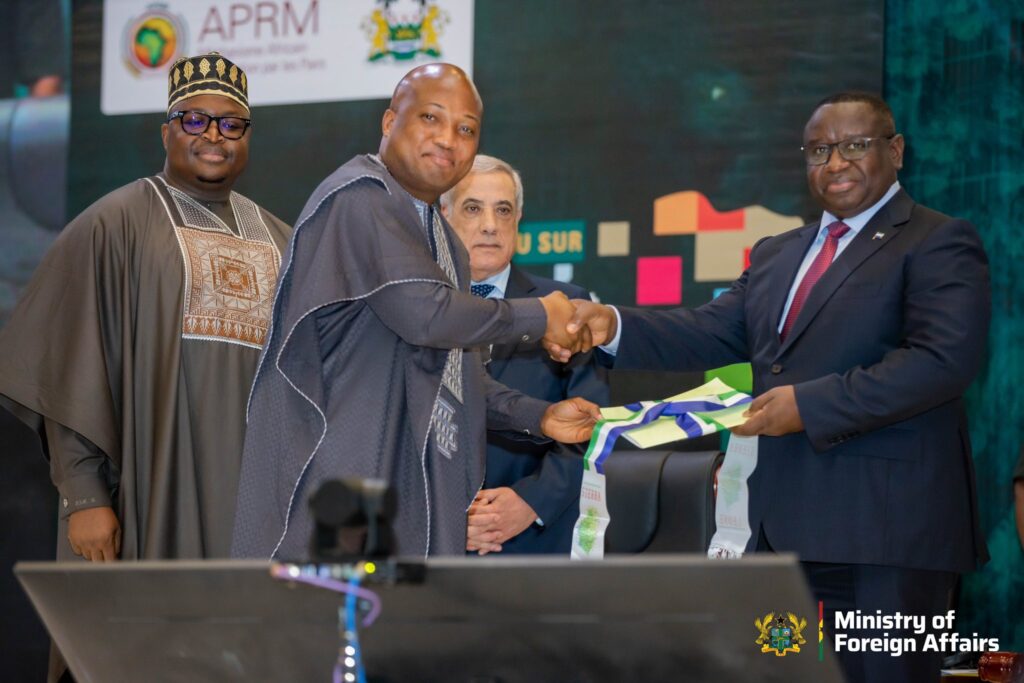Ghana has reaffirmed its commitment to transparent and accountable governance on the continental stage with the formal submission of its legacy governance report to the African Peer Review Mechanism (APRM).
The report, presented on behalf of President John Dramani Mahama by Foreign Affairs Minister Hon. Samuel Okudzeto Ablakwa, was officially handed over to President Dr. Julius Maada Bio of Sierra Leone at a high-level APRM Forum on South-South and Triangular Cooperation held in Freetown.
The submission of the legacy governance report marks a significant step in Ghana’s efforts under President Mahama’s leadership to subject all aspects of his administration to external scrutiny.
In his address at the forum, Hon. Ablakwa emphasized that President Mahama is committed to ushering in a new era of good governance in Ghana—one that is rooted in transparency, accountability, respect for constitutional order, and unwavering dedication to the public good.
“President Mahama has absolutely nothing to hide. This gesture of presenting our legacy governance report for review is a reflection of his strong belief in democratic accountability and his readiness to open his government to the kind of honest assessment that strengthens institutions and improves service delivery.”
Hon. Samuel Okudzeto Ablakwa, Ghana’s Minister of Foreign Affairs
The Africa Peer Review Mechanism, a specialized agency of the African Union (AU), was established in 2003 as part of the implementation of the New Partnership for Africa’s Development (NEPAD).

It serves as a continent-wide tool for assessing governance standards, fostering political stability, promoting sustainable economic growth, and deepening sub-regional and continental integration.
Through the APRM, member countries undertake comprehensive self-assessments covering the executive, judiciary, legislature, civil society, private sector, and media.
The APRM process offers countries a unique opportunity to engage in national dialogue, identify best practices and governance gaps, and reach consensus on the way forward.
It allows African nations to be both evaluators and evaluated, holding one another to high standards in a collaborative framework that values mutual learning over punitive judgment.
Legacy Document
Ghana’s latest report, described by Hon. Ablakwa as a “legacy document,” is expected to highlight the country’s democratic progress, institutional reforms, and challenges encountered under successive administrations.
The Foreign Affairs Minister indicated that the government welcomes the recommendations that will emerge from the APRM review process and will incorporate them into ongoing reforms aimed at enhancing public administration and citizen engagement.

Among the key governance priorities outlined by Hon. Ablakwa at the forum were constitutional reform, strengthening anti-corruption institutions, ensuring the enforcement of strict codes of conduct for all government appointees, and maximizing national resources to benefit the broader Ghanaian population, rather than a privileged few.
“President Mahama is determined to position Ghana as the gold standard for good governance on the continent. We are taking deliberate steps to foster a political culture anchored in service to the people, respect for rights and freedoms, and zero tolerance for abuse of power.”
Hon. Samuel Okudzeto Ablakwa, Ghana’s Minister of Foreign Affairs
The high-level forum in Freetown, which brought together representatives from multiple African states, development partners, and governance experts, provided a platform for sharing experiences on best governance practices and South-South cooperation.

For President Mahama, who has repeatedly pledged to lead a transparent and people-centred administration, this development could further bolster his image as a reformist leader with a clear vision for democratic consolidation.
The Africa Peer Review Mechanism continues to be one of the AU’s most ambitious and innovative tools for enhancing governance across the continent.
It encourages member states to embrace introspection, engage stakeholders from across the political spectrum, and adopt reforms tailored to local contexts.
With the support of civil society, media, and international partners, the implementation of recommendations emerging from the APRM process could significantly influence the future trajectory of Ghana’s governance system.
READ ALSO: Ghana Kickstarts 24-Hour Economy with Bold Strides























